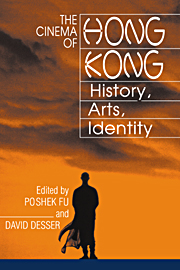Book contents
- Frontmatter
- Contents
- List of Contributors
- Acknowledgments
- Introduction
- Chronology of Hong Kong Cinema
- PART I HISTORY
- 1 The Kung Fu Craze: Hong Kong Cinema's First American Reception
- 2 The American Connection in Early Hong Kong Cinema
- 3 The 1960s: Modernity, Youth Culture, and Hong Kong Cantonese Cinema
- 4 The 1970s: Movement and Transition
- PART II ARTS
- PART III IDENTITY
- Index
3 - The 1960s: Modernity, Youth Culture, and Hong Kong Cantonese Cinema
Published online by Cambridge University Press: 05 June 2012
- Frontmatter
- Contents
- List of Contributors
- Acknowledgments
- Introduction
- Chronology of Hong Kong Cinema
- PART I HISTORY
- 1 The Kung Fu Craze: Hong Kong Cinema's First American Reception
- 2 The American Connection in Early Hong Kong Cinema
- 3 The 1960s: Modernity, Youth Culture, and Hong Kong Cantonese Cinema
- 4 The 1970s: Movement and Transition
- PART II ARTS
- PART III IDENTITY
- Index
Summary
The 1960s was a period of turbulence around the world. The global capitalist order was challenged in a series of youth-led rebellions extending from America to France to Japan and Italy. Raised in middle-class comfort, the romantic postwar generation was estranged from the oppression of the dominant values and declared war against the established order. They claimed to fight for the subalterns (women, minorities, and laborers), striving to build a new world of equality and unfettered liberty. Although this brave new world never came to be, the capitalist world has never been the same.
In the British colony of Hong Kong, which had since the 1950s transformed itself from an entreport to an industrial city, the 1960s was also a period of rapid economic growth and social turmoil. The advent of capitalist modernization generated a new web of mass production and mass consumption that accelerated the erosion of long-standing sociocultural values. Although the colony's political system remained as unresponsive as it had been before the economic boom, generational conflicts became acute as the postwar baby boomers became swept up in the appeal of the modern – liberty, freedom, democracy. Unlike their more cautious parents, many of whom came to Hong Kong to escape the poverty and political upheavals of the mainland, the younger generation was eager to claim the city as their home (as novelist Xi Xi aptly put it, “My City”) and thus articulate their criticsm of the colonial situation.
- Type
- Chapter
- Information
- The Cinema of Hong KongHistory, Arts, Identity, pp. 71 - 89Publisher: Cambridge University PressPrint publication year: 2000
- 8
- Cited by

